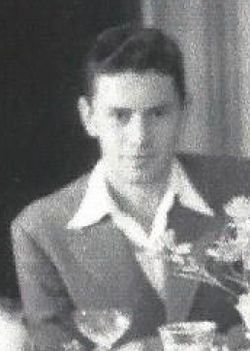Loughnan, David Stephen Herbert
| David Stephen Herbert Loughnan | |
|---|---|
| 1920 – 19 February 1945 | |
 | |
| Nickname | Spud |
| Place of death | near Moyland Wood, Germany |
| Place of burial | Groesbeek Canadian War Cemetery |
| Allegiance | Canada |
| Service/branch | Canadian Army |
| Rank | Captain |
| Unit | 3rd Canadian Divisional Signals |
Early Life
Born to David and Daisy E. Loughnan, who's family immigrated to Canada around the time of the Great War, David Loughnan was the middle of three children. His older sister was Patricia and his younger brother was Brian Ian. David grew up in Capilano British Columbia, now part of North Vancouver.[1]
His parents sent him and his brother to a boarding school in England for the 1934-1935 school year.
Service
Lieutenant Loughnan left Canada for the UK on 24 November and arrived on 2 December 1943. He joined 2 Canadian Corps Signals after leaving the Canadian Signal Reinforcement Unit and he arrived in France on 4 July 1944. He later joined 3rd Canadian Divisional Signals and Commanded "J" Section which was assigned to support 7th Canadian Infantry Brigade.
The History of the Royal Canadian Corps of Signals records his death as follows[2]:The following day the same brigade was at Beek and still in the thick of the fighting. The Regina Rifles and Canadian Scottish were critically engaged out front. Two Signalmen of "J" Section were working on a line to the regiments when the captain commanding the section called to learn their progress. The men expressed concern at being unable to repair the line to the Canadian Scottish whose companies were in difficult straits. Mortar fire was particularly heavy in the area when Capt. D. C. H. Loughnan came out to the scene, picked up his linemen, and set off to find the trouble. In an open field close to the road they detected the break and had just stopped their "Weasel" to repair it when the Signals officer and a number of infantrymen were killed outright by mortar fire. Word was sent back to brigade headquarters, whence a corporal came forward and succeeded in repairing the line.
Memorials
Capt Loughnan's name is recorded on a memorial at the former Brigg Grammar School in England for the 50 previous students who lost their lives in the Second World War.
Related Pages
- No related pages at this time

